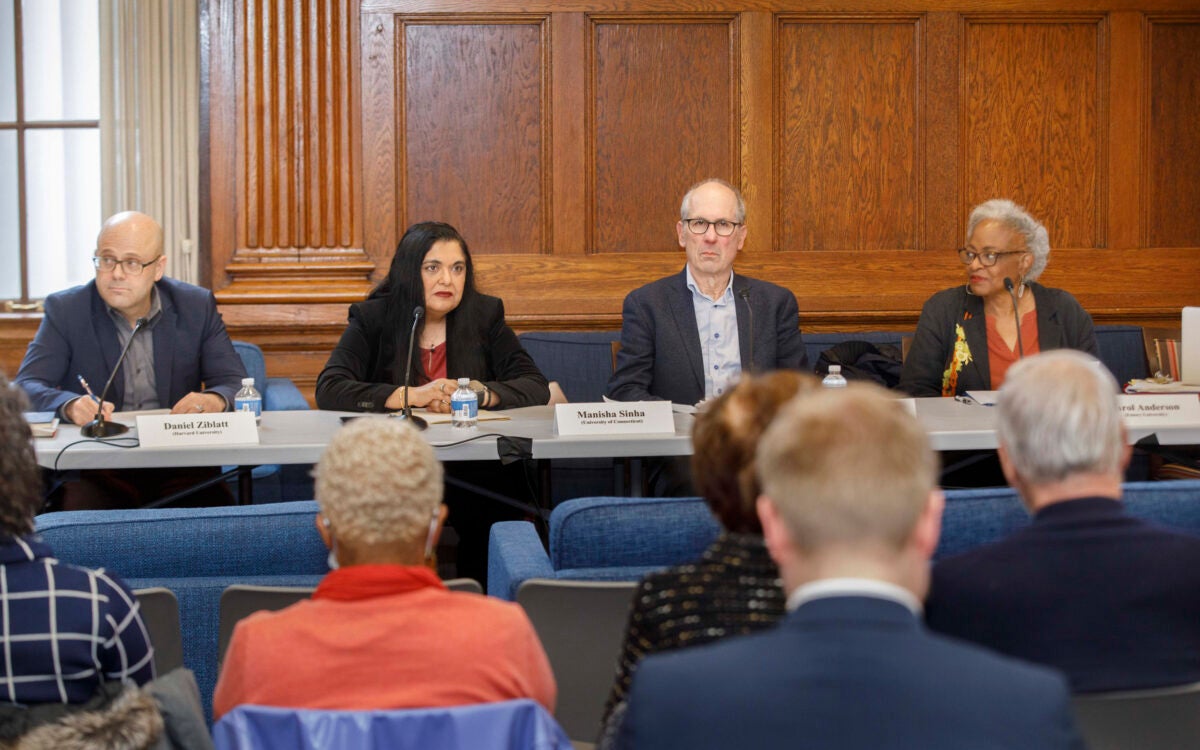Nigerian lawyer is a champion of women
In 2002, a young Nigerian woman by the name of Amina Lawal — pregnant and unmarried — was tried for adultery under Shariah, Islam’s traditional law. She was sentenced to be stoned to death, a fate that briefly riveted the attention of media worldwide.
But the next year, Lawal was free — thanks to a legal defense assembled by Hauwa Ibrahim, the first female lawyer in northern Nigeria’s predominantly Muslim Gombe region.
The case set precedent — important in an Africa where Shariah is increasingly being adopted. Lawal would have been the first woman executed by stoning since parts of Nigeria took on Shariah penal law in 1999.
Once one woman is stoned to death, said Ibrahim to a Harvard audience recently, “it would never stop.”
A Radcliffe Fellow this year, Ibrahim gained legal success by using Shariah law to fight Shariah penalties. It entailed high personal risk, which made having a plan of escape — that is, a way to get out of court alive — necessary in every legal case.
“I am told it is dangerous,” Ibrahim said of a visit she will make to Somalia this month to investigate a case, but “no one should be stoned to death.”
The Lawal case also propelled the veteran Nigerian lawyer into the limelight, where she remains. Ibrahim, among many other honors, was a Yale World Fellow, became an honorary citizen of Paris, and in 2005 earned the European Parliament’s prestigious Sakharov Prize for Freedom of Thought. By that time she had already taken on 90 mostly pro bono cases challenging Shariah law. (The total today: around 150.)
In her Radcliffe year, she is writing a book on the Shariah penal code and how it relates to human rights and to gender and justice. Ibrahim — forceful, funny, and resplendent in a pale blue head covering and a silky white cape — shared a draft of her thoughts last week (Nov. 24) to a full house of 250 rapt listeners at the Radcliffe Gymnasium.
“I became educated by accident,” she said of her upbringing in a remote Gombe village, where to this day there is no running water, electricity, or roads — and where girls are not expected to go beyond elementary school.
“Stone Her to Death? Why? Defending Women Within Shariah Courts” was this year’s Rama S. Mehta lecture, a tradition since 1981 at the Radcliffe Institute for Advanced Study. The periodic talk, intended to spotlight a distinguished woman, was established by Harvard economist, author, and professor John Kenneth Galbraith (who died in 2006) and his wife, Catherine Atwater Galbraith.
Ibrahim called her native country “vast, wide, and rich” — but troubled by poverty, political corruption, ethnic unrest, and a religious divide. Less than 10 years ago, after throwing off decades of military rule, most counties in the Muslim north adopted Shariah for both civil and criminal cases.
That meant adopting at least the possibility of death by stoning, a punishment that Ibrahim said is “an old tradition” but not found in the Quran.
Until 1999, British common law — inherited from Nigeria’s colonizers — was the basis of the judicial system. Shariah was used — if at all — only in civil cases. After that, in at least 12 states in the Muslim north, using alcohol or stealing could mean the loss of a limb. Adultery, for females, could mean death under a hail of stones.
A decade ago, the Muslim north lost political power and social status under a new democratic regime — a condition that made these states turn inward and thus, more likely to adopt Shariah, said Ibrahim. This Islamic legal code was not only an alternative expression of power, it was also a way for Muslims to cling to identity in the face of globalization.
Caught up in this tightening religious net, in part, are Ibrahim’s clients. “They are illiterate,” she said of all those she represents. “They are powerless, they are poor, and they have no voice.”
Any legal case comes down to the law, the facts, technicalities, and procedures, said Ibrahim, who was a state prosecutor before taking up defense work. But there are confounding issues too.
Some are practical, she said — including press attention that can both help or hinder a pending case. (Ibrahim recalled the necessity of not expressing joy or triumph after the Lawal verdict, as these are emotions considered an insult to the presiding male judges.)
Other issues are more philosophical, which she will puzzle over in her book. The law is supreme, but whose law? A separation of powers is important, but what about cases where the source of justice and political power reside in one man?
In any event, Ibrahim’s legal strategies always depend on knowing and respecting local values, and the dynamics of the ruling mullahs. She described covering herself “head to toe,” then falling to her knees in front of a group of mullahs — arguing her legal point, but insisting on her subordinate status.
“We act locally,” said Ibrahim, “but we think globally.”




